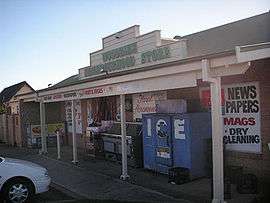Woodbine, New South Wales
| Woodbine Sydney, New South Wales | |||||||||||||
|---|---|---|---|---|---|---|---|---|---|---|---|---|---|
 Woodbine Neighbourhood Store | |||||||||||||
| Coordinates | 34°02′53″S 150°49′29″E / 34.04803°S 150.82464°ECoordinates: 34°02′53″S 150°49′29″E / 34.04803°S 150.82464°E | ||||||||||||
| Population | 2,639 (2011 census)[1] | ||||||||||||
| Established | 1976 | ||||||||||||
| Postcode(s) | 2560 | ||||||||||||
| Location | 57 km (35 mi) south-west of Sydney CBD | ||||||||||||
| LGA(s) | City of Campbelltown | ||||||||||||
| State electorate(s) | Campbelltown | ||||||||||||
| Federal Division(s) | Macarthur | ||||||||||||
| |||||||||||||
Woodbine is a suburb of Sydney, in the state of New South Wales, Australia. It is 55 kilometres south-west of the Sydney central business district, in the local government area of the City of Campbelltown and is part of the Macarthur region. Woodbine shares the postcode of 2560 with Campbelltown.
History
Officially the name Woodbine comes from a local cottage which was home to a prominent local family, the Paytens, from the 1870s to the 1960s. James Payten's cottage sat upon the hill now known as Payten Reserve. His daughter Rose Payten, was a NSW Tennis Champion and Campbelltown's first sports star. From 1901-04 and again in 1907 she held the NSW Triple Crown, Singles, Doubles and Mixed Doubles Champion. The road that connects Woodbine and Leumeah, Rose Payten Drive is named after her. It has also been suggested that, during a Council argument about the name of the suburb, a disgruntled councillor suggested it be named after the cigarettes of his chain-smoking colleagues, and it was from this off-the-cuff remark that serious consideration was given to the name Woodbine.[2]
For over 30,000 years the area that is now Woodbine belonged to the Tharawal people.[3][4] The surrounding land still contains reminders of their past lives in rock engravings, cave paintings, axe grinding grooves and shell middens. A local park Kanbyugal Reserve is named after a Tharawal leader who met with explorer George Caley in the area in the early 19th century.[2]
British settlers began moving into the area in the early 19th century, establishing farms and orchards in the area. Rose Payten died in 1951 and her aging Woodbine cottage was demolished in the 1960s. By the 1970s, the expanding Sydney was large enough for developers to look at the area around Campbelltown. Developers such as Landcom began building homes here and the first residents moved into them in 1976. Originally the suburb was going to be named Kiddlea in honour of John Kidd, a local MP from 1877-1904. Many councillors did not like the idea and with the Woodbine Cottage reference brought up in council, the name was changed to Woodbine.
The streets of Woodbine are named after Sydney beaches. The planners of the suburb got creative and placed the streets in geographical order. North Woodbine is named after Sydney's northern beaches such as Terrigal, Patonga, Avoca, Long Reef, Mona Vale and Manly. The southern end is named after southern beaches such as Cronulla, Elouera, Wanda, Bondi and Coogee. The middle of the suburb was developed by the council as prestige housing. The 1980s saw the tree-less ridge turned into a community forest called Kanbyugal Reserve after an Aboriginal warrior chief and roamed the area in the 1800s. The area in front of the forest known as Woodbine Ponds is currently neglected but local government have mentioned a wish to open it up as parkland.
Australia's First Underground Display Home was built in Ettalong Place by Jewan Constructions in 1981.[5]
Woodbine has one of the largest concentration of restaurants in a suburb in Sydney. Sitting at the northern entrance to Campbelltown, Woodbine has been home to fast-food restaurants such as McDonalds and KFC for many years. It is also home to a Red Rooster, Hungry Jacks and Oporto Restaurant. Family restaurants include Sizzler, Outback Steakhouse and Hooters, the Sizzler and Hooters are both 1 of only 3 in all of Sydney. The restaurants and the adjoining Ibis Budget Hotel and the Quest Apartments make Woodbine the gateway to Campbelltown and the closest thing to an "America-town" in Sydney and has been affectionately dubbed "cholesterol corner".
Demographics
In the 2011 Australian Bureau of Statistics Census, Woodbine had a population of 2,722 people. Around 70% of residents were Australian born but there were a substantial number of languages other than English spoken including Arabic (6%), Spanish (2%), Cantonese (2%), Greek (1%) and Filipino (1%). The majority of families were couples with children (62%) and the proportion of people aged 20–24 years old in the suburb (10%) was the highest in the suburb. Virtually all the homes in the area were separate houses (97%) with the majority (75%) owned outright or under mortgage. Approximately 55% of the suburb followed a Christian religion. Woodbine matches the national average income per household. Within the suburb itself, there were no Housing Commission properties. Unemployment in the area (5%) was lower than the national average with clerical, sales and service workers the most common occupation.[1]
References
- 1 2 Australian Bureau of Statistics (31 October 2012). "Woodbine (State Suburb)". 2011 Census QuickStats. Retrieved 16 February 2014.
- 1 2 "History of Woodbine". Campbelltown City Council. Retrieved 22 April 2016.
- ↑ Liston, C: The Dharawal and Gandangara in colonial Campbelltown, New South Wales, 1788-1830, article in Aboriginal History, vol.12, 1988: p.48-62.
- ↑ "Campbelltown's Environment" (PDF). Campbelltown City Council. Archived from the original (PDF) on 13 September 2006. Retrieved 3 March 2008.
- ↑ Macarthur Country Visitor Information Guide Spring/Summer 1981/1982, Macarthur Country Promotions, 1981.